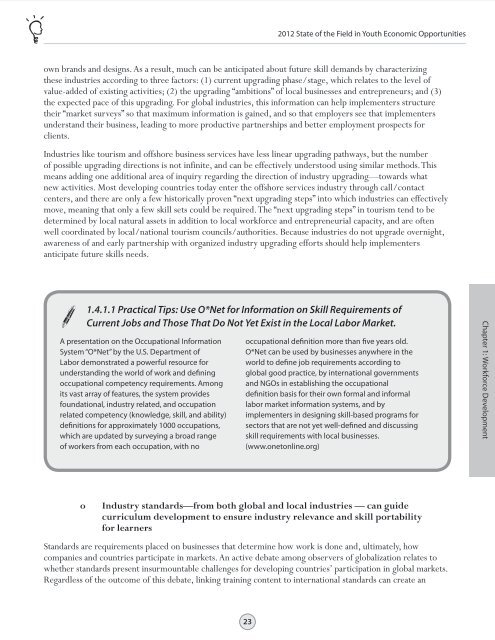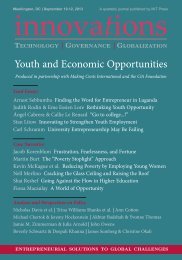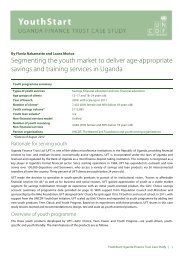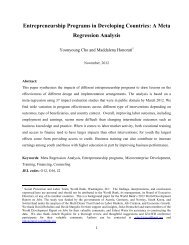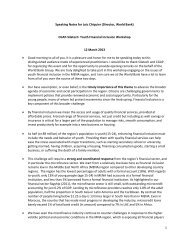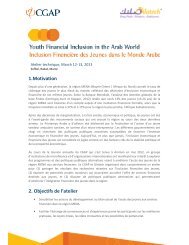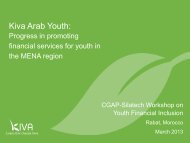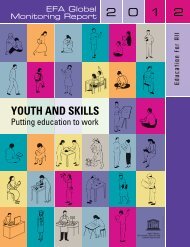STATE OF THE FIELD IN YOUTH ECONOMIC OPPORTUNITIES
STATE OF THE FIELD IN YOUTH ECONOMIC OPPORTUNITIES
STATE OF THE FIELD IN YOUTH ECONOMIC OPPORTUNITIES
You also want an ePaper? Increase the reach of your titles
YUMPU automatically turns print PDFs into web optimized ePapers that Google loves.
Table of Contents<br />
Chapter 1 Chapter 2 Chapter 3 Chapter 4 Chapter 5 Chapter 6 Chapter 7 Chapter 8<br />
Chapter 9<br />
Chapter 10 Chapter 11 Chapter 12 Chapter 13 Chapter 14 Chapter 15 Annexes<br />
2012 State of the Field in Youth Economic Opportunities<br />
own brands and designs. As a result, much can be anticipated about future skill demands by characterizing<br />
these industries according to three factors: (1) current upgrading phase/stage, which relates to the level of<br />
value-added of existing activities; (2) the upgrading “ambitions” of local businesses and entrepreneurs; and (3)<br />
the expected pace of this upgrading. For global industries, this information can help implementers structure<br />
their “market surveys” so that maximum information is gained, and so that employers see that implementers<br />
understand their business, leading to more productive partnerships and better employment prospects for<br />
clients.<br />
Industries like tourism and offshore business services have less linear upgrading pathways, but the number<br />
of possible upgrading directions is not infinite, and can be effectively understood using similar methods. This<br />
means adding one additional area of inquiry regarding the direction of industry upgrading—towards what<br />
new activities. Most developing countries today enter the offshore services industry through call/contact<br />
centers, and there are only a few historically proven “next upgrading steps” into which industries can effectively<br />
move, meaning that only a few skill sets could be required. The “next upgrading steps” in tourism tend to be<br />
determined by local natural assets in addition to local workforce and entrepreneurial capacity, and are often<br />
well coordinated by local/national tourism councils/authorities. Because industries do not upgrade overnight,<br />
awareness of and early partnership with organized industry upgrading efforts should help implementers<br />
anticipate future skills needs.<br />
1.4.1.1 Practical Tips: Use O*Net for Information on Skill Requirements of<br />
Current Jobs and Those That Do Not Yet Exist in the Local Labor Market.<br />
A presentation on the Occupational Information<br />
System “O*Net” by the U.S. Department of<br />
Labor demonstrated a powerful resource for<br />
understanding the world of work and defining<br />
occupational competency requirements. Among<br />
its vast array of features, the system provides<br />
foundational, industry related, and occupation<br />
related competency (knowledge, skill, and ability)<br />
definitions for approximately 1000 occupations,<br />
which are updated by surveying a broad range<br />
of workers from each occupation, with no<br />
occupational definition more than five years old.<br />
O*Net can be used by businesses anywhere in the<br />
world to define job requirements according to<br />
global good practice, by international governments<br />
and NGOs in establishing the occupational<br />
definition basis for their own formal and informal<br />
labor market information systems, and by<br />
implementers in designing skill-based programs for<br />
sectors that are not yet well-defined and discussing<br />
skill requirements with local businesses.<br />
(www.onetonline.org)<br />
Chapter 1: Workforce Development<br />
o<br />
Industry standards—from both global and local industries — can guide<br />
curriculum development to ensure industry relevance and skill portability<br />
for learners<br />
Standards are requirements placed on businesses that determine how work is done and, ultimately, how<br />
companies and countries participate in markets. An active debate among observers of globalization relates to<br />
whether standards present insurmountable challenges for developing countries’ participation in global markets.<br />
Regardless of the outcome of this debate, linking training content to international standards can create an<br />
23


